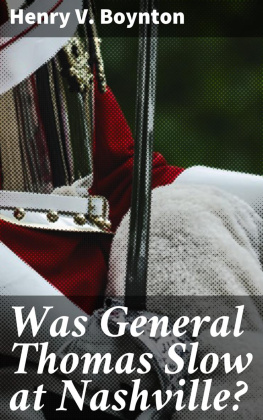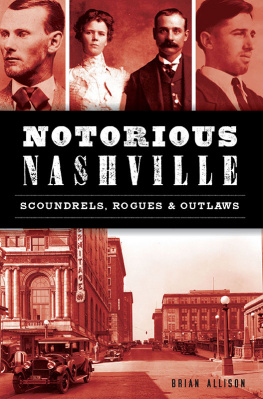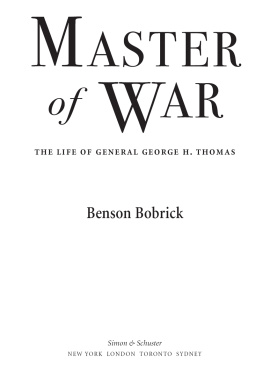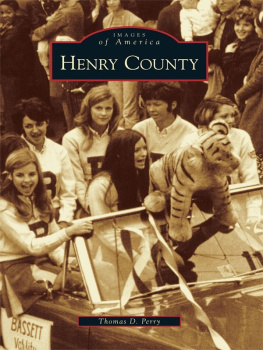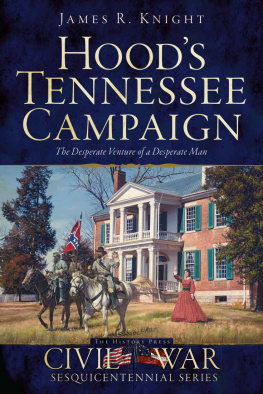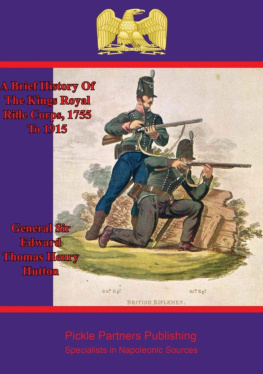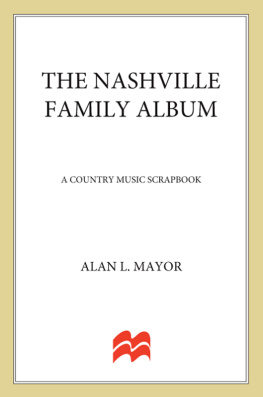PREFACE.
Table of Contents
A recent revival of the venerable charge that General George H. Thomas was slow at Nashville led to the publication, in the New York Sun of August 9, 1896, of the article which is here reproduced by the permission of that journal. A few brief additions have been made to the original text.
It seemed the more important to some of the veterans of the Army of the Cumberland that this charge in its renewed form should be met, because it was put forth with a show of official authority which would naturally give it weight with readers who were not familiar with the war records.
The discussion of the subject also afforded an opportunity to present, though in very concise form, the outlines of those magnificent cavalry operations under General James H. Wilson in the battle of Nashville, and in his subsequent independent campaign through Alabama and Georgia, all of which were without parallel in our war.
Though these movements constitute one of the most brilliant chapters in our war historyin fact, in the history of cavalry in any warthe country really knows little about them, because they were performed out of sight in Alabama and Georgia, while the attention of the country was fixed upon the fall of Richmond and the great events immediately following it. For this reason it is believed that the brief story here presented will not be without interest.
H. V. B.
Washington, D. C. , September, 1896.
WAS GENERAL THOMAS SLOW AT NASHVILLE?
Table of Contents

new generation has come upon the stage since our civil war. It has its own writers on the events of that struggle. Some of these, careful students as they are, make proper and effective use of the stores of material which the Government has collected and published. Others, stumbling upon interesting dispatches of notable campaigns, read them in connection with the ill-considered and hasty criticisms of the hot times which brought them forth, and, finding questions settled twenty years ago, but entirely new to themselves, they proceed to reveal them as new things to the new generation. By this process it has recently been announced that General Thomas was slow at Nashville. To give this echo of thirty-two years ago sufficient voice, several columns of dispatcheswhich a quarter of a century since formed the basis of discussions that demolished the theory they are now brought forward to sustainare gravely presented as something new.
Nothing better illustrates this situation than the very familiar story of the Irishman who assaulted the Jew for the part he took in the Crucifixion, and upon being remonstrated with upon the ground that the event occurred eighteen hundred years ago, replied that it was nevertheless new to him, as he had only heard of it the day before.
That General Thomas was not slow at Nashville is ancient history. General Grant, who was the first to charge it, was also the first to withdraw the imputation, by declaring in his official report that at the time he had been very impatient over what appeared as unnecessary delay on the part of Thomas, but his final defeat of Hood was so complete that it will be accepted as a vindication of that distinguished officers judgment.
The ostensible reason for heralding Thomas as slowso slow, indeed, as to require his removal and lead to an order for itwas that he insisted upon concentrating his infantry force and remounting his cavalry. Secretary Stanton declared that the delay would be till doomsday if Thomas waited for the latter.
A consideration of this most important, underlying, and controlling factor in General Thomass preparations brings up one of the most brilliant chapters in our war history, and altogether the most brilliant in the annals of cavalry operations.
In touching upon General Thomass persistence in getting his cavalry ready, it would be very natural for a surface student to quote Secretary Stanton: If he waits for Wilson to get ready, Gabriel will be blowing his last horn, and treat it as conclusive proof of Thomass dilatoriness and Stantons final opinion. But just far enough under the surface to escape the eyes of historical amateurs, lies the splendid and unparalleled fact that in eight winter days after the date of that dispatch General James H. Wilson, Thomass chief of cavalry, had impressed horses enough, with those furnished on previous requisitions, to raise the effective mounted force at Nashville from 5500 to 13,500, and that on the eighth day General Wilson went into action with 12,000 mounted men, and had besides one brigade of 1500 men engaged in an independent movement.
At this point a moments consideration of the real reasons which caused the outbreak against General Thomas, on the ground that he was slow, will not be out of place. At City Point it was the perfectly natural but sickening anxiety lest it should turn out that a great mistake had been made in letting Sherman march away to the sea, thus possibly opening the way for Hood to the Ohio. At Savannah it was the same fear, intensified by the consciousness that Thomas had been left with unprepared forces to contend against a veteran army which had stubbornly resisted both Thomas and Sherman during the hundred days from Dalton to Atlanta.
And so, while Thomas, as all who were on the ground knew, was making superhuman exertions to prepare fully for the task in hand, he was advised to fight, pressed to fight, ordered to fight, threatened with removal if he did not fight, and his successor dispatched to relieve him. And the underlying cause of it all was the demoralizing fear that Hood might elude or overthrow Thomas and strike for the Ohio, and the country rise in wrath to inquire why Sherman, with 62,000 thoroughly equipped veterans, including a larger force of mounted men than he left behind, had been allowed to march away from the central theater of war. So great was this fear at Savannah that even after receiving Thomass dispatch giving an account of the first days battle at Nashville, which resulted in driving Hoods left eight miles (which movement General Grant characterized as a splendid success), Sherman telegraphed that this attack on Hood was successful but not complete: that he awaited further accounts with anxiety, as Thomass complete success was necessary to vindicate his own plan for this campaign.
Throughout all this inside panic in high official circles, only Thomas and the trusted officers who supported him at Nashville were cool and unmoved in the memorable crisis.
THOMAS ORGANIZING HIS ARMY.
Table of Contents
The concentration and organization of the fragments which finally made up the force with which he practically annihilated his enemy was one of the most remarkable accomplishments of the war. It was prosecuted and consummated in the immediate presence of the enemy, and a large portion of the work was performed during the continued movement, constant skirmishing, frequent affairs, and one great battle of an active campaign.


 new generation has come upon the stage since our civil war. It has its own writers on the events of that struggle. Some of these, careful students as they are, make proper and effective use of the stores of material which the Government has collected and published. Others, stumbling upon interesting dispatches of notable campaigns, read them in connection with the ill-considered and hasty criticisms of the hot times which brought them forth, and, finding questions settled twenty years ago, but entirely new to themselves, they proceed to reveal them as new things to the new generation. By this process it has recently been announced that General Thomas was slow at Nashville. To give this echo of thirty-two years ago sufficient voice, several columns of dispatcheswhich a quarter of a century since formed the basis of discussions that demolished the theory they are now brought forward to sustainare gravely presented as something new.
new generation has come upon the stage since our civil war. It has its own writers on the events of that struggle. Some of these, careful students as they are, make proper and effective use of the stores of material which the Government has collected and published. Others, stumbling upon interesting dispatches of notable campaigns, read them in connection with the ill-considered and hasty criticisms of the hot times which brought them forth, and, finding questions settled twenty years ago, but entirely new to themselves, they proceed to reveal them as new things to the new generation. By this process it has recently been announced that General Thomas was slow at Nashville. To give this echo of thirty-two years ago sufficient voice, several columns of dispatcheswhich a quarter of a century since formed the basis of discussions that demolished the theory they are now brought forward to sustainare gravely presented as something new.
